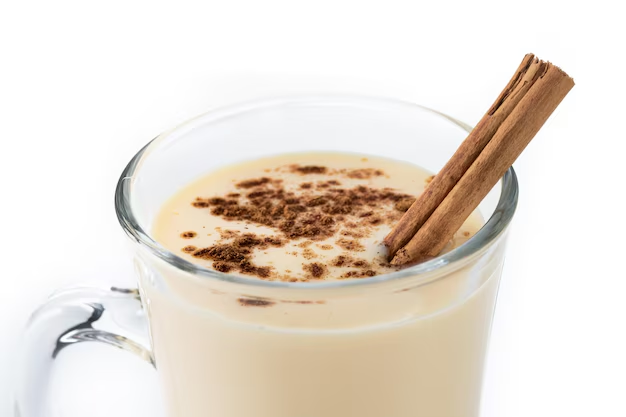Eggnog is a beloved holiday drink enjoyed around the world. Known for its creamy texture and rich flavor, it brings warmth to festive celebrations. But what about its ingredients? For those keeping an eye on caffeine intake, it’s important to know if eggnog contains caffeine. In this article, we’ll explore the composition of traditional eggnog, its modern variations, and options for those avoiding caffeine.
What Is Eggnog?
Historical Background and Origins
Eggnog has roots in early medieval Britain, where it began as a hot milk-based beverage called posset. Over time, this drink evolved into the eggnog we know today, gaining popularity in colonial America. It became a holiday staple, often spiked with rum or brandy for added warmth.
Traditional Ingredients in Classic Eggnog Recipes
Traditional eggnog recipes are fairly simple. The core ingredients include:
- Milk and cream for richness.
- Eggs, which give it its signature custard-like texture.
- Sugar, providing sweetness.
- Spices such as nutmeg or cinnamon for flavor.
This classic recipe has been cherished for centuries. But does it naturally contain caffeine? Let’s find out.
Does Traditional Eggnog Contain Caffeine?
Analysis of Standard Ingredients
The standard ingredients in traditional eggnog—milk, cream, eggs, sugar, and spices—do not naturally contain caffeine. None of these components are derived from caffeinated sources. The drink’s creamy consistency and sweet taste are entirely caffeine-free.
Confirmation That Traditional Eggnog is Caffeine-Free
Yes, traditional eggnog is completely caffeine-free. This makes it a safe option for children, pregnant women, or anyone trying to avoid caffeine. However, variations of eggnog may tell a different story.
Variations of Eggnog and Their Caffeine Content
Modern twists on eggnog have introduced caffeine into the mix. Let’s explore how.
Eggnog-Flavored Coffees and Lattes
One of the most popular eggnog-inspired beverages is the eggnog latte. These are commonly offered by coffee shops during the holiday season. They combine traditional eggnog flavors with:
- Espresso or brewed coffee.
- Steamed milk and spices for flavor balance.
The caffeine content depends on the coffee used. For example, a standard espresso shot has about 63 mg of caffeine. So, if your eggnog latte has two shots, it could contain over 120 mg of caffeine.
Eggnog Teas
Eggnog-flavored teas are another festive option. These teas often use black or green tea as a base, blended with nutmeg, cinnamon, and vanilla to mimic eggnog flavors.
- Black teas can have around 40-70 mg of caffeine per cup.
- Green teas contain 20-50 mg of caffeine.
While delicious, these variations are unsuitable for those avoiding caffeine altogether.
Related to Read: Does Chai Latte Have Caffeine? Everything You Need to Know
Caffeine-Free Eggnog Alternatives
For those sensitive to caffeine, there are excellent alternatives that deliver the same festive flavors without the buzz.
Caffeine-free eggnog-flavored beverages cater to individuals avoiding stimulants. These products retain the holiday spirit without compromising on taste or dietary restrictions.
Herbal Teas and Decaf Options
- Herbal teas with eggnog flavoring: These blends use ingredients like rooibos or chamomile, offering a warm and cozy drink that’s completely caffeine-free.
- Decaf eggnog lattes: Made using decaffeinated coffee or espresso, these drinks still pack the creamy eggnog punch without the caffeine.
Examples of Caffeine-Free Eggnog Products
Brands now offer ready-made eggnog in dairy-free and caffeine-free varieties. Options made with almond milk, oat milk, or soy milk are gaining traction for their inclusivity and flavor. These are perfect for those who want a festive treat without any caffeine.
Health Considerations When Consuming Eggnog
Eggnog is a festive favorite, but like any indulgence, it comes with health considerations. From its nutritional content to dietary restrictions and caffeine sensitivity, understanding eggnog’s impact on your health can help you make better choices. This guide dives into eggnog’s profile, popular products, and a simple caffeine-free recipe.
Nutritional Profile
Eggnog’s rich flavor comes from its ingredients, but it’s also worth noting its nutritional breakdown.

Caloric Content and Macronutrient Breakdown
Eggnog is a calorie-dense beverage. A single cup of traditional eggnog can contain:
- 200-400 calories depending on the recipe.
- Fats: About 10-20 grams, primarily from cream and milk.
- Proteins: Around 5-10 grams from the eggs and dairy.
- Sugars: A significant 20-30 grams from added sweeteners.
This high caloric and sugar content makes it a drink best enjoyed in moderation.
Presence of Alcohol in Some Recipes and Its Implications
Some eggnog recipes include alcohol like rum, brandy, or bourbon. While this adds flavor and warmth, it also increases the calorie count and can affect individuals sensitive to alcohol. Pregnant women, individuals with liver conditions, or those on certain medications should avoid alcohol-laden eggnog.
Caffeine Sensitivity
Caffeine sensitivity can influence which eggnog products or variations you choose.
Advice for Individuals Sensitive to Caffeine
If you’re sensitive to caffeine, opt for traditional eggnog, as it is naturally caffeine-free. However, avoid eggnog-flavored coffees, teas, and lattes, as these often contain significant amounts of caffeine. Always check product labels for caffeine content to make an informed choice.
Dietary Restrictions
Eggnog’s rich ingredients can pose challenges for those with dietary limitations.
Considerations for Lactose Intolerance and Egg Allergies
- Lactose Intolerance: Traditional eggnog is dairy-heavy, but many brands now offer lactose-free or plant-based versions made with almond, oat, or soy milk.
- Egg Allergies: As a key ingredient, eggs can be problematic for those allergic. Egg-free eggnog alternatives are available, often using thickening agents or plant-based substitutes.
These adaptations ensure everyone can enjoy a festive eggnog treat, regardless of dietary needs.
Popular Eggnog Products in the U.S. Market
There’s no shortage of eggnog-inspired drinks in the U.S. Here are some of the most popular options, along with their unique features.
Starbucks Eggnog Latte
The Starbucks Eggnog Latte is a seasonal favorite.
- It combines espresso with steamed eggnog and milk.
- A typical 16-ounce serving contains around 150 mg of caffeine, making it unsuitable for those avoiding caffeine.
- It’s rich and indulgent, perfect for coffee lovers seeking festive flavors.
Bigelow Eggnogg’n Black Tea
Bigelow offers an eggnog-flavored black tea blend.
- This tea mimics eggnog’s creamy flavor using natural spices.
- It contains about 30-60 mg of caffeine per cup, depending on brew strength.
- It’s a lighter, less caloric alternative to traditional eggnog.
Perk Energy Caffeine-Free Eggnog
Perk Energy’s caffeine-free eggnog mix is a fantastic alternative for those avoiding stimulants.
- Made with natural flavors, it’s designed for a comforting, festive experience without caffeine.
- It’s also lower in calories compared to traditional eggnog.
These products cater to diverse preferences, from high-energy options to caffeine-free comfort.
How to Make Your Own Caffeine-Free Eggnog at Home
Want to enjoy eggnog without worrying about caffeine? Making your own is easy and allows for customization.

Simple Recipe with Step-by-Step Instructions
Here’s a simple, caffeine-free eggnog recipe:
Ingredients:
- 2 cups of whole milk.
- 1 cup of heavy cream.
- 3 large egg yolks.
- ½ cup of sugar.
- ½ teaspoon of vanilla extract.
- ¼ teaspoon of nutmeg (plus more for garnish).
Instructions:
- In a medium saucepan, heat milk and cream over medium heat until just simmering.
- In a bowl, whisk egg yolks and sugar until light and fluffy.
- Slowly add the hot milk mixture to the eggs while whisking continuously to temper the eggs.
- Return the mixture to the saucepan and cook on low heat, stirring, until thickened (about 5 minutes). Do not let it boil.
- Remove from heat and stir in vanilla extract and nutmeg.
- Chill in the refrigerator before serving. Garnish with nutmeg.
Tips for Customizing Flavors and Sweetness
- Add maple syrup or honey instead of sugar for a natural sweetener.
- Use dairy alternatives like almond or coconut milk for lactose-free versions.
- Adjust spices to your liking, such as adding cinnamon or cloves.
This homemade version lets you control the ingredients and tailor it to your dietary preferences.
Conclusion
Eggnog is a versatile and festive beverage that can be enjoyed in various forms. While traditional eggnog is caffeine-free and rich in flavor, modern variations may contain caffeine or adapt to dietary restrictions. Whether you buy it ready-made, enjoy a latte at your favorite coffee shop, or whip up your own batch at home, there’s an option for everyone. Remember to savor it in moderation and choose versions that align with your health needs.
FAQs
- Does eggnog contain caffeine?
Traditional eggnog does not contain caffeine. Variations like eggnog lattes or teas may have caffeine due to added coffee or tea.
- What are some lactose-free eggnog options?
Many brands now offer lactose-free eggnog made with almond milk, oat milk, or soy milk. These are great for individuals with lactose intolerance.
- Can eggnog be made without eggs?
Yes, egg-free eggnog alternatives use plant-based thickeners or substitutes like coconut cream to mimic the texture of traditional eggnog.
- Is it safe to drink eggnog during pregnancy?
Pregnant women should avoid eggnog with unpasteurized eggs or alcohol. Pasteurized, non-alcoholic versions are safe.
- How can I reduce the calorie content in eggnog?
Use low-fat milk or dairy alternatives, reduce added sugar, or choose lighter variations like eggnog-flavored teas.

